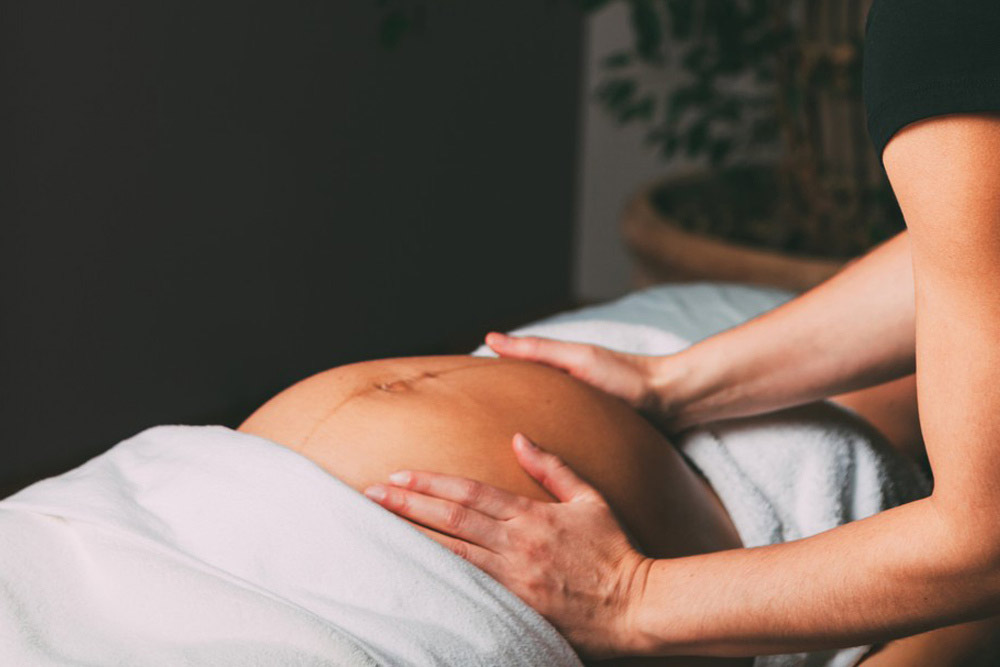The Hol(istic) Truth About Acupuncture and Pregnancy

A look at what acupuncture and other alternative medicines can do for your prenatal health.
“I just want to keep things natural” has become a familiar refrain amongst moms-to-be. The idea is good and well, but suffering through nine months of nausea, backaches and swelling sans relief can quickly become miserable as you await your due date. Luckily, holistic treatments are being recognized in obstetrics and are readily available to cure some of pregnancy’s common ailments. Here’s a look at all-natural options that are safe and effective from first trimester to postpartum.
Can Acupuncture Help With Infertility?
Traditional acupuncture has been used in the East for thousands of years, but it has recently surged in popularity as a complementary therapy in the West. In particular, women are turning to acupuncture treatment to help them conceive, says Denise Cicuto, a licensed acupuncturist in San Francisco. That’s because the practice uses small needles to target certain acupuncture points that are said to help increase blood flow to the reproductive organs, which might enhance fertility. “If getting pregnant has been difficult, then acupuncture by itself—or acupuncture combined with in vitro fertilization (IVF)—can be very effective because it helps create an optimal environment for baby to grow,” Cicuto explains.
What are Additional Benefits of Acupuncture?
Acupuncture sessions are also effective at remedying some of pregnancy’s woes, if performed effectively by a licensed practitioner, says Cynthia Ignatovsky, a professional acupuncturist in Campbell, California. “Pregnancy is an exciting and wonderful time, but with the many physical and hormonal changes that occur, it can also be a time of discomfort,” she says. “Many pregnant women suffer from fatigue, nausea, lower back pain and other conditions that are considered a ‘normal’ part of pregnancy. Acupressure is a gentle and effective way to address these complaints, especially since many Western medications can’t be used during this time.”
Other positive effects of acupuncture include increased relaxation (which is helpful for mom’s blood pressure), relief from constipation, depression and insomnia, decreased back, neck and pelvic pain, and even correction of a breech presentation (with the use of both moxibustion and acupuncture).
In addition, women who receive acupuncture once a week in their last month of pregnancy often have significantly shorter labor times than those who don’t, Ignatovsky notes. This is because the acupuncture points help to relax and soften the uterine ligaments and bring blood flow to the pelvis. In turn, this encourages the proper position for baby to descend into the birth canal while simultaneously preparing the cervix for labor.
Interested in trying it out? Just be sure to tell your acupuncturist you are expecting, so she knows which specific points to avoid, as certain areas are said to stimulate uterine contractions. Make sure you get the green light from your health care provider beforehand, too.
What About Herbal Treatments?
With so many supplements on the market claiming to be pregnancy-safe, it’s hard to know which herbal remedies are actually harmless, much less effective. That’s why having a licensed herbalist who specializes in women’s health and prenatal care is so important, says Cicuto. She creates custom blends of herbs that are personalized to individuals’ needs. “In traditional Chinese medicine, herbal prescriptions are customized to a person’s constitution … just telling women to take ginger tea for morning sickness in early pregnancy may make nausea worse in some cases where mint might be better,” she explains.
For that reason, Ignatovsky also works with patients one-on-one, so she can recommend herbal treatments based on what they might need. “Herbs are usually combined as a custom recipe and not given as single herbs,” she says. Common herbs that are said to be effective and safe for pregnancy that might appear in one of her blends include peppermint leaf and ginger root to alleviate morning sickness; slippery elm bark to help with heartburn and vaginal irritation; and oats and oat straw, which are rich in calcium and magnesium, to calm anxiety and restlessness.
If your obstetrician is hesitant about using herbs during pregnancy, Cicuto recommends asking your herbalist to provide documentation on the effectiveness and safety of particular formulas. Just be sure to avoid any herbs your doctor advises to be unsafe for pregnancy, as they can have consequential side effects, such as initiating uterine contractions or being toxic to the baby.
Will Massage Offer Similar Benefits to Acupuncture?
If you’re hesitant about acupuncture needles, prenatal massage may be a good alternative to try. Prenatal massage therapy is another holistic treatment some women rely on to relieve tension, stress and pains that occur during pregnancy. A good prenatal massage specialist can reduce anxiety, decrease symptoms of depression, relieve muscle aches and joint pain and even improve labor outcomes and newborn health, according to the American Pregnancy Association. Swelling is another common culprit that a good session might be able to remedy.
“As a massage and craniosacral therapist, I would never neglect enjoying the bodywork aspect of pregnancy,” says Jennifer Friedman, a certified massage therapist in Miami. “Massage can do wonders for pregnant women, from improving poor circulation to increasing energy to wiping away stress and relaxing sore muscles.” Friedman also recommends trying craniosacral therapy, which targets the nervous system. This type of gentle massage focuses on the sacrum, spinal cord and head, bringing fluids, membranes and bones in the body into balance. “It is a deep healing method, though light to the touch,” Friedman assures.
What Other Ways Can Mom Support Her Pregnancy?
In addition to seeking out holistic treatments, there are plenty of ways women can take up an au naturel lifestyle during their pregnancy, if they so choose. Ignatovsky recommends eating a diet of non-processed foods, practicing prenatal yoga and seeking chiropractic treatments during and after pregnancy to help with pelvic alignment. She also strongly advises women to adhere to their doctors’ recommendations when it comes to taking prenatal vitamins and other supplements, such as omega-3s, DHA, vitamin D3 and extra calcium.
Pregnancy is a great time to get in tune with your natural rhythms, especially before the chaos of motherhood begins. “During pregnancy, try to do less,” Cicuto advises. “I know that it’s hard for a lot of women, but doing less, resting and listening to your body are really important.”







